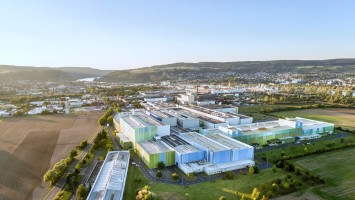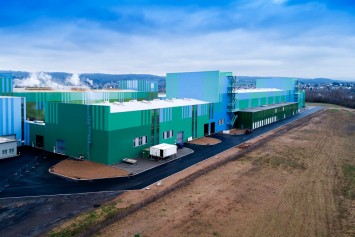The company manufactures tinned and special chromium coated steel at the world’s largest production site for packaging steel in Andernach, Germany. The material, which comes with or without an organic coating (e.g. paint, foil), is well suited for a broad variety of packaging solutions, such as food cans, aerosol cans, or closures. Quality control and monitoring begins right at the steel plant itself, at parent company thyssenkrupp Steel in Duisburg. The quality of raw steel is of vital importance to producing the purest packaging steel with outstanding surface properties. The steel plant in Duisburg and the plant in Andernach collaborate closely with one another. They exchange quality parameters on a daily basis to ensure continuous monitoring and control.
An integrated quality manamenet system with state-of-the-art measuring technology is then used throughout the entire production process in Andernach. All relevant data and findings are immediately available to subsequent process stages, where they automatically intervene in process control and are used for decision-making by the plant operator. The quality management system of Germany’s only packaging steel manufacturer is so special because: even though a control system manages the entire production process, it’s people who ultimately decide whether the quality of each of the systems is just right. Continuous training ensures that employees at all of the plants can immediately recognize flaws and then make the right decisions.
Quality assurance: fast, flexible, competent

Michael Wild is Head of Quality Technical Support (QTS) at thyssenkrupp in Andernach. He explains: “We stand out thanks to our short response time, speed, flexibility and expertise. We ensure this by using detection, analysis and evaluation tools along the entire process chain, as well as by our quality assurance team. During our regular company-wide audits, conducted by our quality management officer, we pay particular attention to ensuring that every employee acquires the appropriate skills and that we can benefit from perfect and sustainable interaction between our employees and the tools in order to provide our customers with the best possible level of quality.”
Big Data for more quality
thyssenkrupp Rasselstein GmbH has been collecting, storing and analyzing huge volumes of data to optimize processes for several years now. The company’s use of “big data” has paved the way for new quality tracking. In practice, this means that anomalies can be traced back to any point in the production chain and across all stages of production. The collected data enables static evaluations and provides evidence that previously could only be determined by an extensive series of tests. thyssenkrupp Rasselstein GmbH uses only state-of-the-art measuring techniques, such as a mobile surface inspection system developed in-house, and purity measuring instruments that continuously support the improvement process, to go above and beyond material and quality requirements in the future.
In addition to the measurement data and the many years of experience employees have, another important aspect of thyssenkrupp Rasselstein GmbH’s qualiy management system is the continuous optimization of processes. At thyssenkrupp in Andernach, it has been possible to collect and process data for statistical process control (SPC) since 1995. In 2006, the detection systems were outfitted to save and visualize meter-related data. Tracking quality to a new level has been made possible by storing, capturing, and analyzing large volumes of data (“big data”) since 2013.
The Future of Quality Management

will play an even more important role in quality management in the future. Manual quality control measures, such as tensile tests or analysis of sample panels in the test center, are supplemented by digitally recorded data. This results in faster and more precise results, meaning that product quality will likely be further increased in the future by sharing measurement data between systems.
Communication, big data, modern tools, and last but not least human skills, are the factors for the success of quality management and ultimately the well-known and valued quality of rasselstein® packaging steel.





